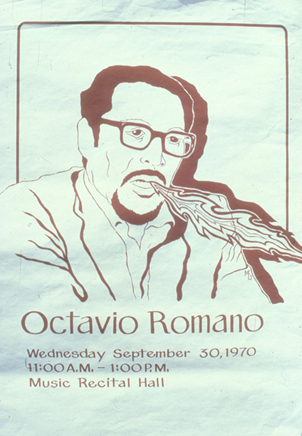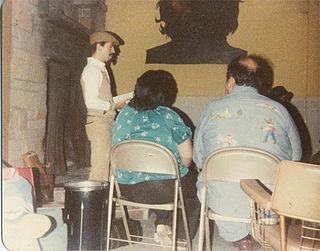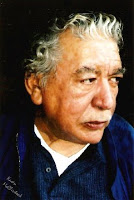
Gary Anthony Soto is an American poet, novelist, and memoirist.
Larry Patrick Levis was an American poet and teacher who published five books of poetry during his lifetime. Two more volumes of previously unpublished poems appeared posthumously, and received general acclaim.

Quinto Sol was the first fully independent publishing house to surface from the Chicano movement in the Sixties. Editorial Quinto Sol was founded in 1967 at UC Berkeley by Octavio I. Romano, a professor of Behavioral Science and Public Health, in collaboration with Nick C. Vaca and Andres Ybarra. The name "Quinto Sol" is Spanish for "Fifth Sun" and it refers to the Aztec myth of creation and destruction. Since the beginning of the Chicano movement in the 1960s, this concept has become a pathway to cultural expression. The Fifth Sun has constantly been integrated into the music, art and literature of the Chicano idea.
José Antonio "Tony" Burciaga was an American Chicano artist, poet, and writer who explored issues of Chicano identity and American society.

Luis Miguel Valdez is an American playwright, screenwriter, film director and actor. Regarded as the father of Chicano film and playwriting, Valdez is best known for his play Zoot Suit, his movie La Bamba, and his creation of El Teatro Campesino. A pioneer in the Chicano Movement, Valdez broadened the scope of theatre and arts of the Chicano community.

Alberto Baltazar Urista Heredia, better known by his nom de plume Alurista, is an American poet and activist. His work was influential in the Chicano Movement and is important to the field of Chicano poetry.

Luis Javier Rodriguez is an American poet, novelist, journalist, critic, and columnist. He was the 2014 Los Angeles Poet Laureate. Rodriguez is recognized as a major figure in contemporary Chicano literature, identifying himself as a native Xicanx writer. His best-known work, Always Running: La Vida Loca, Gang Days in L.A., received the Carl Sandburg Literary Award and has been controversial on school reading lists for its depictions of gang life.

Chicano poetry is a subgenre of Chicano literature that stems from the cultural consciousness developed in the Chicano Movement. Chicano poetry has its roots in the reclamation of Chicana/o as an identity of empowerment rather than denigration. As a literary field, Chicano poetry emerged in the 1960s and formed its own independent literary current and voice.

Juan Felipe Herrera is an American poet, performer, writer, toonist, teacher, and activist. Herrera was the 21st United States Poet Laureate from 2015 to 2017. He is a major figure in the literary field of Chicano poetry.

JesúsAbraham "Tato" Laviera was a Puerto Rican poet in the United States. Born Jesús Laviera Sanches, in Santurce, Puerto Rico, he moved to New York City at the age of ten, with his family, to reside in the Lower East Side. Throughout his life he was involved in various human rights organizations, but was best known as a renowned Nuyorican poet. An obituary for NBC Latino describes him as "one of the greatest representatives of the Nuyorican movement."

Mexican American literature is literature written by Mexican Americans in the United States. Although its origins can be traced back to the sixteenth century, the bulk of Mexican American literature dates from post-1848 and the United States annexation of large parts of Mexico in the wake of the Mexican–American War. Today, as a part of American literature in general, this genre includes a vibrant and diverse set of narratives, prompting critics to describe it as providing "a new awareness of the historical and cultural independence of both northern and southern American hemispheres". Chicano literature is an aspect of Mexican American literature.

Lorna Dee Cervantes is an American poet and activist, who is considered one of the greatest figures in Chicano poetry. She has been described by Alurista as "probably the best Chicana poet active today."
Alfred Arteaga was a Mexican-American poet, writer, and scholar. He was noted as an important poet of the Chicano Movement, who also contributed to the foundations postcolonial and ethnic studies.
Bilingual Review Press is an American publishing house specialising in the publication of scholarly and literary works by Hispanic and Latino American authors and researchers. It was founded in 1973 as the publisher of The Bilingual Review/La revista bilingüe, a new academic and literary journal with a focus on Spanish-English bilingualism, bilingual studies and Hispanic literature that was first issued in 1974. Under the imprint name Bilingual Press/Editorial Bilingüe the press also publishes and distributes book titles by or about Hispanic and Latin American authors, covering literary fiction, poetry as well as non-fiction titles relating to Chicano and Latin American studies. Bilingual Press publishes from 8 to 10 titles annually, with an accumulated back catalogue of more than 150 titles under the imprint in both English and Spanish as well as some bilingual editions. The publisher is also a distributor of related titles from other presses, as of 2008 numbering over a thousand releases.

American literature in Spanish in the United States dates back as 1610 when the Spanish explorer Gaspar Pérez de Villagrá published his epic poem Historia de Nuevo México. He was an early chronicler of the conquest of the Americas and a forerunner of Spanish-language literature in the United States given his focus on the American landscape and the customs of the people. However, it was not until the late 20th century that Spanish language literature written by Americans was regularly published in the United States.

Andrés Montoya was a Chicano poet.
Bernice B. Ortiz Zamora is an American Chicana poet, "one of the preeminent poets to emerge from the Chicano movement of the 1960s and 1970s". She received a B.A. in English and French from Southern Colorado State College and an M.A. in English from Colorado State University in Fort Collins in 1972. In 1972, she enrolled in the English doctoral program at Marquette University and transferred to Stanford University the following year, where she ultimately received her Ph.D. in 1976. Besides being an accomplished poet, Zamora also taught classes in ethnic studies, Chicano studies, and literature at Santa Clara University, Stanford University, University of California, and University of San Francisco. She has served as a guest editor and co-editor for various publications, including the Chicano literary journal El Fuego de Aztlán, De Colores with José Armas, Flor y Canto IV with Armas, and Flor y Canto V with Michael Reed.
Latino literature is literature written by people of Latin American ancestry, often but not always in English, most notably by Mexican Americans, Puerto Ricans, Cuban Americans, and Dominican Americans, many of whom were born in the United States. The origin of the term "Latino literature" dates back to the 1960s, during the Chicano Movement, which was a social and political movement by Mexican Americans seeking equal rights and representation. At the time, the term "Chicano literature" was used to describe the work of Mexican-American writers. As the movement expanded, the term "Latino" came into use to encompass writers of various Latin American backgrounds, including Mexican, Puerto Rican, Cuban, and others.
José Angel Figueroa is a Puerto Rican poet, actor, author, editor, and a professor in the Humanities who has published poetry, fiction, and drama in the United States. He is best known for his poetry and is considered one of the first Neorican poets and contributed to the rise of the Nuyorican Literary movement. He was an early contributor to the Nuyorican Poets Café and has influenced the scene of Latino literature in New York through education, writing, and outreach.
Neil Raymond Ricco, formerly known as Noel Rico, is a Spanish-Italian American poet and writer known for his works featured in publications by Nicolás Kanellos, Eileen Myles and Mike Marqusee. Ricco was an early member of the Nuyorican Poets Café and he appeared in the film Friend of the World.












